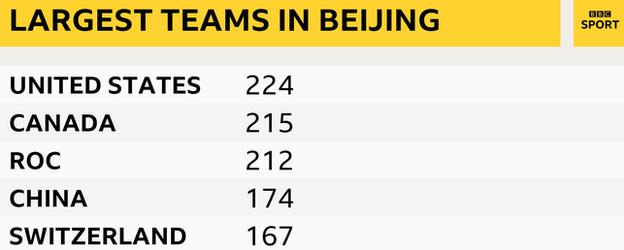ARTICLE AD BOX
| Hosts: Beijing, China Dates: 4-20 February |
| Coverage: Watch live on BBC TV, BBC iPlayer, BBC Red Button and online; listen on BBC Radio 5 Live and BBC Sounds; live text and highlights on BBC Sport website and mobile app |
After a troubled and controversial build-up, the 2022 Winter Olympics are about to get under way in Beijing.
Almost 3,000 athletes from 91 nations will compete to get their hands on one of 109 gold medals on offer across seven sports.
Although live sport started on Wednesday with mixed doubles curling, the opening ceremony takes place on Friday, marking the official start of the 24th Winter Games.
"The world is turning its eyes to China and China is ready. We will do our best to deliver to the world a streamlined, safe and splendid Games," Chinese President Xi Jinping said on Thursday.
But these are already controversial Olympics, with protests and diplomatic boycotts over alleged human rights abuses, while the Covid-19 pandemic continues to have an impact with strict control measures in place.
Here's everything you need to know.
The facts of Beijing
Beijing is the first city to host both the summer and winter Games, 14 years after it hosted the 2008 summer Olympics.
The event takes place across three clusters. Beijing itself will host the indoor events - curling, speed skating, figure skating and ice hockey - as well as the big air and the opening and closing ceremonies.
Yanqing, located 75km (47 miles) out of Beijing, is the home of the sliding sports - bobsleigh, skeleton and luge - and alpine skiing, while the mountains of Zhangjiakou, 180km (111 miles) away from the Chinese capital, host the freestyle skiing and snowboarding events, ski jumping, biathlon and cross-country.
Many of the venues in Beijing from the 2008 Games have been repurposed, including swimming's Water Cube, which has been renovated to become the home of curling, and the Bird's Nest stadium, which will host the opening and closing ceremonies.
Artificial snow has been used across all venues - although there was some natural snowfall in Zhangjiakou in the week leading up to the Games. It is estimated that 49m gallons (222.8m litres) of water have been used to produce the fake snow in Yanqing alone.
But that isn't a concern for GB's athletes, with snowboarder Katie Ormerod telling BBC Sport: "I grew up in the UK so it's all artificial snow."
How will Team GB fare?
Fifty athletes will fly the flag for Team GB in Beijing, with three returning medallists - Izzy Atkin (freestyle skiing), Laura Deas (skeleton) and Eve Muirhead (curling) - among them. And the 2014 ski slopestyle silver medallist Gus Kenworthy is also competing for Britain, after switching from the United States.
Muirhead, Dave Ryding (alpine skiing), Andrew Musgrave and Andrew Young (both cross-country skiing) are set to compete at their fourth Olympics, while 29 athletes will make their debuts.
There are three sets of siblings in the team - Izzy and Zoe Atkin, and Leonie and Makayla Gerken Schofield, will compete in freestyle skiing, while brothers Farrell and Niall Treacy race in the short track speed skating.
Snowboard cross world champion Charlotte Bankes is a favourite for gold in her event, in what will be her third Games overall but first for Team GB, having switched from France in late 2018.
UK Sport believes Team GB can win between three and seven medals in Beijing, with five the team's previous best in both 2014 and 2018.
Nielsen Gracenote predicts three will be won, with golds for Bankes and the mixed curling duo of Bruce Mouat and Jen Dodds, while the men's curling rink are predicted to win silver.
"We are confident we are taking a more competitive team across more disciplines than ever before. That's a great place to be in," chef de mission Georgina Harland told BBC Sport.
"What's great is we are confident there will be interest across those full 16 days of competition, so something for everybody back home to get behind.
What about the rest of the world?

The United States have sent a 222-strong team to Beijing, making them the biggest squad at the Games, while 17 nations have sent just one athlete, including India and Ecuador.
Norway, who topped the medal table four years ago in Pyeongchang, are again expected to dominate the cross-country skiing events and will also hope for alpine skiing success through Aleksander Aamodt Kilde, who is favourite in the super-G.
He is also tipped to challenge Switzerland's Beat Feuz in the blue riband men's downhill, while the Norwegian's American girlfriend Mikaela Shiffrin needs one more gold to set a record for the most Olympic wins by an American alpine skier. She has a good chance as she is aiming to compete in all five women's individual events.
Veteran American snowboarder Shaun White is back for a fifth Games, while 49-year-old German speed skater Claudia Pechstein will be competing at her eighth. At the opposite end of the scale, 15-year-old Russian Kamila Valieva is the hot favourite for gold in the women's figure skating.
Valieva is one of the 212 athletes competing under the flag of the Russian Olympic Committee, with Russia still banned from international competition because of doping sanctions.
In figure skating Japan's Hanyu Yuzuru is set to attempt to become the first person to land a quadruple axel in competition as he seeks a third men's title in a row in what promises to be an intriguing duel with American Nathan Chen.
China will be aiming for a good showing at their home Games, with freestyle skier Eileen Gu leading their hopes in three events for a country whose best winter Olympics showing is 11 medals at Vancouver 2010.
Two countries are making their Winter Olympics debuts - Haiti and Saudi Arabia - both in alpine skiing.
Covid-19 and controversies
Beijing 2022 is the second Olympics to take place during the Covid-19 pandemic, and just like in Tokyo last summer, there will be no fans, friends or family present in the stands.
All Games participants, from athletes to volunteers to the media, undergo daily PCR tests and are enclosed in a strict closed-loop system in which movement is limited for the entirety of the Olympics.
Face masks are mandatory at all times, except for during competition and training, and when eating and drinking, or alone in rooms.
But Covid isn't the only shadow looming over these Games. The International Olympic Committee (IOC) has been heavily criticised for awarding the Olympics to China because of the country's alleged human rights abuses.
Human rights groups say the Chinese government has gradually stripped away the religious and other freedoms of Uighur Muslims - a minority group which lives mostly in the Xinjiang province in north-west China - culminating in an oppressive system of mass surveillance, detention, indoctrination, and even forced sterilisation.
China has consistently denied allegations of human rights abuses in Xinjiang, insisting camps were not detention camps, but "vocational educational and training centres".
As a result, many countries, including the UK, United States and Canada, have declared a diplomatic boycott of the Games.
IOC president Thomas Bach has repeatedly defended the decision to award the Winter Olympics to Beijing and on Thursday said that in the two years leading up to the Games he had seen "the dark clouds of the growing politicisation of sport on the horizon".
"We also saw that in some peoples' minds the boycott ghosts of the past were rearing their ugly heads again," Bach said.

- Watch the trailer for Chloe: A twisted psychological thriller uncovering the dark side of our obsession with social media
- Why Ships Crash: The definitive story of how the Suez Canal crisis triggered global panic


 2 years ago
36
2 years ago
36








 English (US) ·
English (US) ·